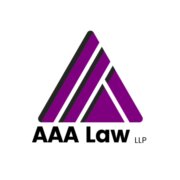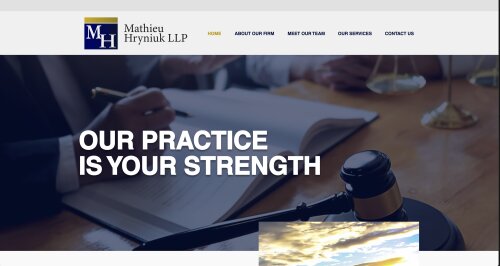Best New Business Formation Lawyers in Toronto
Share your needs with us, get contacted by law firms.
Free. Takes 2 min.
List of the best lawyers in Toronto, Canada
About New Business Formation Law in Toronto, Canada:
New Business Formation in Toronto, Canada refers to the process of establishing a legal entity, such as a corporation or partnership, to conduct business activities in the city. This process involves various legal considerations and requirements, which must be complied with to ensure a smooth and lawful setup.
Why You May Need a Lawyer:
While it is possible to navigate the New Business Formation process without legal assistance, hiring a lawyer can be highly beneficial in several situations:
- Complex Business Structure: If you plan to establish a business with multiple shareholders, partners, or investors, a lawyer can help create legally binding agreements that outline rights, responsibilities, and profit-sharing arrangements.
- Registration and Compliance: A lawyer can guide you through the necessary registrations, permits, licenses, and compliance requirements at the municipal, provincial, and federal levels.
- Intellectual Property: If your business involves unique inventions, designs, or trademarks, a lawyer can help protect your intellectual property rights through patents, copyrights, or trademarks.
- Contracts and Agreements: A lawyer can draft, review, and negotiate contracts with suppliers, customers, employees, or landlords, ensuring that your interests are protected and the terms are fair.
- Dispute Resolution: In the event of business disputes or legal issues, a lawyer can provide guidance, represent your interests, and help resolve conflicts through negotiation, mediation, or litigation.
Local Laws Overview:
When starting a new business in Toronto, Canada, it is important to be aware of the following local laws and regulations:
- Business Registration: All new businesses must register with the province of Ontario and obtain necessary permits and licenses, depending on the nature of the business.
- Taxation: Businesses must comply with federal, provincial, and municipal tax obligations. This may include registering for goods and services tax (GST) or harmonized sales tax (HST), filing annual tax returns, and remitting payroll taxes.
- Employment Laws: Businesses must adhere to employment standards, including minimum wage, hours of work, overtime pay, vacation entitlements, and employee benefits.
- Commercial Leases: If your business premises are leased, it is important to understand the terms of the lease agreement, including rent, duration, renewal options, and any restrictions on use.
- Consumer Protection: Toronto has consumer protection laws that businesses must comply with, ensuring fair business practices, accurate advertising, and protection of consumer rights.
Frequently Asked Questions:
1. Can I start a business without registering it?
No, it is mandatory to register your business with the province of Ontario. Registering ensures that your business has legal status, can enter into contracts, and can comply with government regulations.
2. What type of business structure should I choose?
The optimal business structure depends on factors such as your liability, tax considerations, and future growth plans. Common options include sole proprietorship, partnership, corporation, or a cooperative. Consulting with a lawyer can help you determine the best structure for your business.
3. How long does it take to register a business in Toronto?
The processing time for business registration varies but can range from a few days to several weeks, depending on the complexity of your business structure and the accuracy of your application.
4. What licenses or permits do I need for my business?
The licenses and permits required depend on the nature of your business. Examples include a business license, zoning permits, health permits, liquor licenses, or professional licenses. Researching specific requirements and consulting with a lawyer can help you identify the necessary permits.
5. What intellectual property can I protect for my business?
You can protect various forms of intellectual property, including inventions (patents), creative works (copyrights), business names (trademarks), and confidential information (trade secrets). Consulting with an intellectual property lawyer can help you understand what can be protected and how to obtain protection.
Additional Resources:
- Government of Canada's official website for starting a business: https://www.canada.ca/en/services/business/start.html
- City of Toronto's Business Services webpage: https://www.toronto.ca/business-economy/business-operation-growth/business-start-up/
- Law Society of Ontario's Lawyer Referral Service: https://lso.ca/public-resources/finding-a-lawyer-or-paralegal/lawyer-referral-service
Next Steps:
If you require legal assistance in New Business Formation in Toronto, Canada, follow these steps:
- Identify your specific legal needs, such as contract drafting, incorporation, or intellectual property protection.
- Research and identify reputable lawyers or law firms in Toronto who specialize in business law and New Business Formation.
- Contact potential lawyers to discuss your needs and evaluate their expertise and experience in handling similar cases.
- Arrange a consultation with the selected lawyer to further discuss your requirements, fees, and timelines.
- Based on your consultation, engage the lawyer or law firm that best meets your needs and proceed with the necessary legal documentation and steps for your New Business Formation.
Lawzana helps you find the best lawyers and law firms in Toronto through a curated and pre-screened list of qualified legal professionals. Our platform offers rankings and detailed profiles of attorneys and law firms, allowing you to compare based on practice areas, including New Business Formation, experience, and client feedback.
Each profile includes a description of the firm's areas of practice, client reviews, team members and partners, year of establishment, spoken languages, office locations, contact information, social media presence, and any published articles or resources. Most firms on our platform speak English and are experienced in both local and international legal matters.
Get a quote from top-rated law firms in Toronto, Canada — quickly, securely, and without unnecessary hassle.
Disclaimer:
The information provided on this page is for general informational purposes only and does not constitute legal advice. While we strive to ensure the accuracy and relevance of the content, legal information may change over time, and interpretations of the law can vary. You should always consult with a qualified legal professional for advice specific to your situation.
We disclaim all liability for actions taken or not taken based on the content of this page. If you believe any information is incorrect or outdated, please contact us, and we will review and update it where appropriate.













